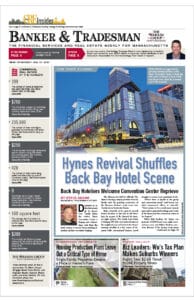His proposal hasn’t even received the obligatory public hearing, but it sounds like Gov. Charlie Baker has received some assurances about the fate of his $920 million, five-year economic development plan for Massachusetts.
Ahead of this week’s foray by the state Treasury into the bond market, Baker, during an investor’s call last week, expressed a high level of confidence about the prospects for legislation he filed in late January to shower the local economy with $918 million in long-term capital spending.
“We believe this legislation, which has been very favorably received by the Legislature, will probably be heard over the course of the next 30 days or so, and likely to be enacted before the Legislature closes out its session in July,” Baker, who frequently meets privately with Democratic legislative leaders, said on the investor’s call.
While the bill faces amendments and the usual back and forth between the House and Senate, a Baker administration aide said the administration had not heard any overarching concerns about the bill from legislators who had been briefed on its provisions.
Job creation bills like Baker’s “Opportunities for All” legislation (H 3983) have been warmly received over the years in the Legislature, especially during election years when lawmakers are eager to show voters they’re advancing measures aimed at improving local communities and addressing fears over economic insecurity.
The governor’s bill, filed on Jan. 27, was referred to the Economic Development and Emerging Technologies Committee on Feb. 4 and the panel has not yet scheduled a public hearing date.
The bill authorizes an additional $500 million over five years for the MassWorks program, which assists cities and towns with infrastructure needs associated with development. The legislation also sets aside $50 million for redevelopment projects in cities, $75 million to redevelop contaminated sites, $25 million for a new site assembly and predevelopment fund, and $25 million for “smart growth housing” featuring moderately priced starter homes for families.
Noting Massachusetts universities are positioned to win federal grants associated with advanced manufacturing, Baker included in his bill authorization for up to $118 million of capital expenditures for a new Massachusetts Manufacturing Innovation Initiative (M2I2) to be administered by the MassTech Collaborative. The goal is to match state funds with federal and industry funds.
The legislation also authorizes $75 million for equipment grants to expand and improve vocational education programs, and Baker’s bill makes changes to the state’s Economic Development Incentive Program that the governor says will make it “more flexible and transparent.” The governor in his bill also doubles from $500,000 to $1 million the limit on loan guarantees from the Massachusetts Export Development Fund and lifts restrictions that Baker says are limiting “consumer choice and market access in the sale of alcoholic beverages.”
Also on the economic development front, action is expected soon on Beacon Hill on legislation authorizing $200 million in capital spending to help cities and towns with local road projects.
During the investor call, Baker said there was a “bipartisan commitment” to further cut the state’s structural budget gap by reducing the use of one-time revenues in the state budget.
Baker’s $39.55 billion fiscal 2017 budget drops the use of nonrecurring revenues to $250 million, down from $1.2 billion two years ago, and makes a rainy day fund deposit of at least $206 million.
Tax revenues in fiscal 2017 are scheduled to grow by 4.3 percent and lawmakers are under considerable pressure to raise spending across an array of accounts, including education aid to cities and towns. Baker wants to hold spending growth to 3.5 percent.
The Massachusetts Treasury on Thursday was in the midst of a two-day bond sale. Assistant treasurer Sue Perez said during the investor call that the Treasury anticipates $70 million in interest rate savings associated with the issuance of $600 million in “new money” tax-exempt bonds to fund capital projects and $501 million in refunding bonds. The bond sale is scheduled to close on March 17.






